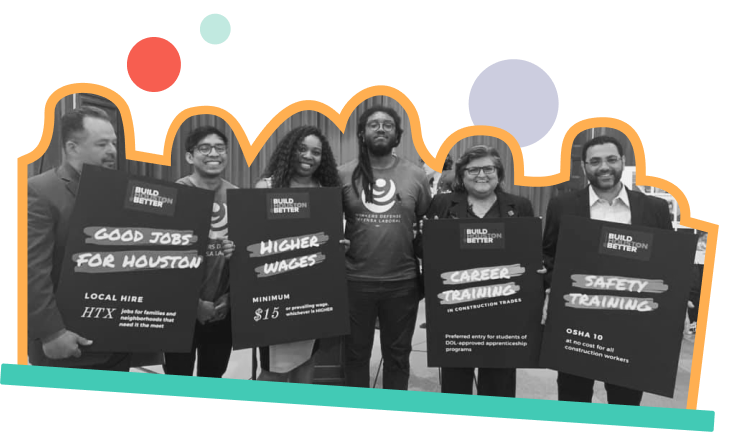Houston’s Strong Mayor, For Business
Houston’s low-income and communities of color, while part of an active organizing and labor landscape, find themselves squeezed at both the state and city level in pushing legislation and regulation that can challenge inequality. Part of what interviewees noted almost unanimously makes local politics a challenge in Houston is a “strong mayor” system. In this way, even as groups have supported progressive council members, the persistence of mayors attached to the status quo has made change a challenge.
Current Houston Mayor Sylvester Turner’s approach was described by some as a “business-friendly Democrat” who sees cooperation with business as necessary to “getting anything done.” That “anything” more often than not is a narrow vision of growth sorely lacking equity, where the quantity matters much more than the quality and value of the companies, jobs, housing, and more. The mayor’s lack of commitment to workers has been shaped by historical and current factors: business interests have developed a massive research, communication, philanthropic, and legislative infrastructure in Houston that makes them hard to ignore, including multiple Chambers of Commerce, a bank, energy-dominated Greater Houston Partnership, and more.

No election too small, no pre-emption off limits
At the state level, Texas has become infamous for deepening experiments in conservative lawmaking and in curbing local power for progressive governance. It’s important to note this is not some ingrained culture in Texas, which has seen its own historical left-populist movements advance a state agenda and governors like Anne Richardson. What this is more indicative of is the strategy advanced by the neoliberal conservative party that put George W. Bush in office starting in the 1980s. Karl Rove and associates’ belief that no office is too small, including pursuit of the state’s Supreme Court; railroad commissioners, agricultural, and other less-visible elected and administrative posts; and wide-ranging state legislative and senate positions. None of this power-grab would be possible without moving in lock-step with large corporations, whether its oil & gas, finance, or developers and tech newer to the scene, who have wielded their power. Texas’ shift after a relentless re-organization of right-wing money, messaging, and movements to local and state elections helped spearhead the right’s own long term national state-level strategy.
What this has meant today is that conservatives have locked up legislative and governor’s offices, and empowered a brazen governorship that often makes divisive, legally-questionable political moves — such as Governor Greg Abbott’s 2021 declaration of an emergency requiring spending on the border wall and harassment of migrants while pre-empting laws including fracking bans, regulations on Uber/Lyft, sanctuary laws and even hands-free/cellphone driving measures. Abbott has often floated making Texas the state with the most comprehensive pre-emption, attempting an ill-formed blanket law in 2017.
The irony of a state party that clamors for “freedom” restricting local independence, and the effect of Abbott's and former Governor Rick Perry’s consolidation of governor’s powers via pre-emption, became even more clear when the state stopped enforceable mask mandates and accelerated economic re-opening in the earliest waves of COVID-19 (with deadly results and Houston County Judge Lena Hidalgo among the most vocal critics).
The constant state executive and legislative power plays divert much local energy to figuring out — often alongside allies in Austin or Dallas — what might be possible to pass legally, whether its worker safety protections or eviction ordinance in the wake of COVID-19. During the COVID-19 pandemic, this perpetuated a wholesale ignoring of the dire conditions faced by low-income communities of color. Where the city will often balk at pre-emption, some labor and community groups have built legal capacity to continue to push for passing policy. As one organizer explained, groups have to always be equipped to reply to how “quite a few Democrats back down with a ‘You can’t do this in Texas’.”

Mobilizing Harris County, Redefining Blue Politics
Despite how much Texas’ story is one of local and state re-alignment, the trend instead had been for the Democratic Party to pour resources routinely around election season in the hopes to shift the national election, finally fully mobilizing the state’s diversity to swing the state. But the pervasive ways power is entrenched — and the lack of in-depth inclusion of the state’s large Latinx (and Black and API) populations, including by establishment Democrats — mean that this strategy has yet to move the dial. A slow recognition of the need for longer-term progressive civic infrastructure, including more resourced, long-term tables represents a more recent shift in course spurred by progressive groups and foundations. This is already proving there is not just one way to get things done in Texas, and that right-wing hold can loosen locally in Houston.
Winning means having tough conversations, organizers shared. Many labor and 501(c)(4) community allies are refusing to simply hand over endorsements to Democratic officials: “Our approach is, don’t take our ability to endorse Democrats for granted; we are independent and have our own program. And if you’re slow we’ll push you.” This is helping inspire new cohorts of much more dynamic and “creative elective officials” who bring in organizations as “partners in policy formulation.”
Grassroots organizing wins
This more long-term, values-aligned strategy is paying off in the Harris County region; organizers have been breaking through. Supported by labor unions and 501(c)(4) progressive groups, several new leaders have taken up positions in the Harris County Court of Commissioners (which oversees governance tying). Most prominently, Lina Hidalgo won election as County Judge at 28 years old in 2018, as did new Commissioners Rodney Ellis and Adrian Garcia, and later County Attorney Christian Menefee in 2020. Most critically, these new officials have been ready to bring the community in as “partners in policy formulation,” one organizer shared.
The victories at this level were not easy (considering how Harris County is larger than many states), but the effects have been tangible. As an interviewee shared, “The county was notorious for 45 minute meetings where they would basically rubber stamp contracts to friends of the county Commissioners.” The new Commissioner line-up radically shifted course, thanks mostly to Hidalgo, making all their meetings public and inviting input and much deeper discussion. Harris County has thus made moves on issues of bail reform, secured a $10 million early education fund, and challenged ICE raids and the “public charge” rule. Facing a barrage of racism, sexism, and condescension, Hidalgo also took great risks during COVID-19 enforcing a mask mandate and seeking to curb exposure.

The new leadership has meant a significant opportunity to give the resurgent voice of workers a real role. Commissioners also pushed forward a significant $15 minimum wage for employees, and — when asked by the Build Houston Better coalition, construction contractors, and the County Attorney Menefee — has also been in dialogue with labor and community to find ways to make worker protections stick and to circumvent pre-emption. The new Harris County regime has also turned the rhetoric of the right wing obsessed with government oversight on its head, instead calling for real results-oriented budgeting that puts to question the kind of sweetheart deals the County has cut with developers who rake in large profits but pay workers little. Part of the challenge is that, unlike the city of Houston, the County lacks specific ordinance making powers — meaning that organizers are not letting up on changing the city government as well.
Yet, given the long-run efforts for right-wing forces to shift judicial, administrative, and legislative positions across the state and down to the local (spanning to the Karl Rove era, see above), change is a hard and painful process that affects the ways even any regulations operate. Inspectors from the Texas Commission on Environmental Quality rarely or slowly respond to residents’ filings regarding toxins sited in their backyard are; worksite regulations often “exist only on paper”; and support for disaster-harmed residents is slow to come (while concessions flow with ease).
This is why active organizing on implementation is a critical focus area for many organizations interviewed, blending direct support with larger campaigns to mobilize communities and spur action. As are innovations like worker councils for construction that support consistent monitoring. The Texas Gulf Coast Area Labor Federation (TGCALF) and Texas AFL-CIO are also working on training workers and labor leaders to run and succeed in city and county Boards and Commissions to build from these changes. This is part of an overall leadership development strategy there and in several other organizations, where future elected leaders are being trained from Houston’s most vulnerable communities.

